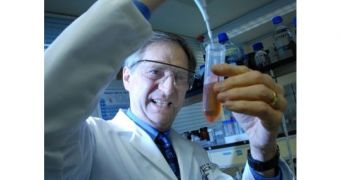A new research carried out by the University of Warwick concluded that blue light can actually activate what could be the first very effective platinum-based cancer treatment.
Warwick researchers had already found a platinum-based compound that they could activate with ultra-violet light, the only problem was the very narrow wave length of light, that was limiting the medical use.
On this new research, scientists from Warwick worked with researchers from Ninewells Hospital Dundee and the University of Edinburgh, and have come up with a new light-activated platinum-based compound, which is up to 80 times more powerful than other platinum-based anti-cancer drugs, and which can also use "light activation" to kill cancer cells in a much more targeted manner than similar treatments.
The 'wonder' compound is called trans,trans,trans-[Pt(N3)2(OH)2(py)2] and it can be activated by normal visible blue light, and even by green light.
It is stable, easy to work with and water soluble, so it can just dissolve and be easily eliminated after use.
“This compound could have a significant impact on the effectiveness of future cancer treatments,” said Professor Peter Sadler, from the Department of Chemistry from University of Warwick, leader of the research project.
“Light activation provides this compound's massive toxic power and also allows treatment to be targeted much more accurately against cancer cells.
“The special thing about our complex is that it is not only activated by ultra-violet light, but also by low doses of blue or green light,” said Sadler.
“Light activation generates a powerful cytotoxic compound that has proven to be significantly more effective than treatments such as cisplatin.
“We believe that photoactivated platinum complexes will make it possible to treat cancers that have previously not reacted to chemotherapy with platinum complexes.
“Tumors that have developed resistance to conventional platinum drugs could respond to these complexes and with less side-effects,” Sadler concluded.
The researchers from Warwick passed the new compound to the Ninewells Hospital Dundee, who tested it on esophageal cancer cells cultivated within lab equipment.
The tests showed that once it was light activated, the compound needed a concentration of only 8.4 micro moles per liter to be effective and kill 50% of the cancer cells.
So the next step is to test it on ovarian and liver cancer cells, and even if early results suggest the method is working, nothing is certain until the tests are over.

 14 DAY TRIAL //
14 DAY TRIAL //